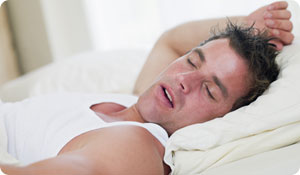
Snoring loudly enough to wake up your sleeping spouse may be more than just annoying, it could signal a serious health problem. Sleep apnea is a disorder in which breathing repeatedly stops and starts, waking you-and your bed partner-from a sound sleep.
There are two main types of sleep apnea: obstructive sleep apnea in which the muscles in the back of your throat relax, narrowing or closing your breathing airway, causing your breathing to momentarily stop, which wakes you from sleep. The less common form of sleep apnea is central sleep apnea in which your brain fails to transmit signals to your breathing muscles, causing you to awaken with shortness of breath.
Sleep apnea can lead to a host of health maladies, especially cardiovascular disease, including high blood pressure, heart failure, stroke, and heart arrhythmias. The link between sleep apnea and heart disease may be associated with obesity, although studies are suggesting that sleep apnea itself may lead to or worsen cardiovascular problems.
Signs of Sleep Apnea
Some of the most common symptoms of sleep apnea include:
- Loud snoring
- Excessive daytime sleepiness
- Observed episodes of breathing cessation during sleep
- Abrupt awakenings accompanied by shortness or breath
- Morning headache
- Difficulty staying asleep
If your snoring is loud enough to disturb your sleep or the sleep of others; you have shortness of breath that awakens you from sleep; there are intermittent pauses in your breathing during sleep; or if you experience excessive daytime drowsiness, which is causing you to fall asleep during work or while you're watching TV or driving, it's time to see your doctor.
Finding Relief
After evaluating your symptoms, your doctor may refer you to a sleep disorder specialist, who will probably recommend overnight monitoring in a sleep center to observe your breathing during sleep. For mild cases of sleep apnea, making some lifestyle changes, such as losing weight or quitting smoking, may be all that's needed to help you get a good night's sleep.
However, if your apnea is more severe, you may need to be fitted for a continuous positive airway pressure (CPAP) machine that delivers air pressure through a mask that's placed over your nose while sleeping. The air pressure from the CPAP machine keeps your upper airway passages open, preventing apnea and snoring. In some cases, surgery to remove excess tissue from the nose and throat, which may be blocking the upper air passages, may be necessary to give you relief. Your doctor will help you determine which treatment is best for you.
Sources:
University of Maryland Medical Center. "Obstructive Sleep Apnea - Complications."
http://www.umm.edu/patiented/articles/who_has_sleep_apnea_000065_4.htm





